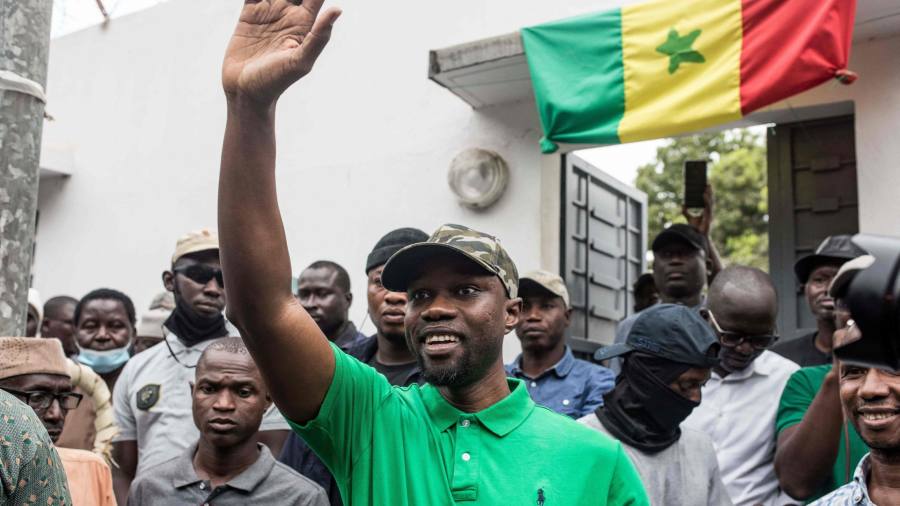
Senegal’s leading opposition politician has been sentenced to two years in prison in relation to a series of incidents that took place at a massage parlour, despite being acquitted on charges of rape.
Ousmane Sonko, a former tax inspector who was set to challenge President Macky Sall in next year’s elections, faced trial after being accused in 2021 of repeatedly raping a woman at the establishment.
A court in the capital Dakar on Thursday acquitted Sonko on the rape charge, but convicted him on a separate charge of “corrupting the youth”. One of his lawyers was quoted by the AFP news agency as saying that this meant debauching or encouraging the debauchery of a person under the age of 21.
The verdict will complicate the 48-year-old’s ambitions to challenge Sall because Senegal’s electoral law bans people with criminal convictions from seeking political office. It also has the potential to spark serious unrest in what is traditionally one of Africa’s most stable democracies. At least 12 people died during protests that lasted several days after Sonko was first arrested in 2021.
Sonko and his supporters have alleged that his legal woes are a tool for the government to prevent him running in the February 2024 presidential election, for which he has declared his candidacy. Senegalese prosecutors deny the charge.
Sonko, a former chief tax inspector who is mayor of the southern town of Ziguinchor, was not in court to hear the verdict. It is unclear if a warrant has been issued for his arrest and whether he will file an appeal. Sonko is at present appealing against a six-month suspended sentence and a $330,000 fine after being found guilty in March of libel against Senegal’s tourism minister.

Tensions have been building in recent weeks ahead of the court verdict, with at least one person killed and several others injured during a “freedom caravan” that was escorting Sonko to the capital. The opposition leader and his supporters have accused security forces of being heavy-handed in their response to the caravan and previous demonstrations.
Sonko, who leads the African Patriots of Senegal for Work, Ethics and Fraternity party, gained nationwide attention in 2016 when he exposed alleged tax dodging by members of Senegal’s elite. He was fired from his role as chief tax inspector, but his anti-corruption message resonated with young people in the country. Sonko became a lawmaker a year later and ran for president against Sall in 2019, finishing third with 16 per cent of the vote.
Sall is said to be considering running for a third term, despite a constitutional limit that the president serves no more than two. His allies say a 2016 constitutional amendment allows him to run again.
Mucahid Durmaz, senior analyst at risk intelligence company Verisk Maplecroft, said that if Sonko was banned from standing for election it would “increase the sense of disenfranchisement among his supporters and it will further inflame widespread protests across the country leading up to the election”.
Sonko has accused France, the former colonial power, of conspiring against his candidacy. He has previously pledged to replace the west African franc that is used by eight countries in the region including Senegal and is pegged to the euro.
Sonko’s message has resonated with those who believe France wields too much influence in their country, as well as those who are frustrated by the lack of economic opportunities for young Senegalese.
Ndeye Khady Ndiaye, owner of the massage parlour, also received a two-year jail sentence for “incitement to debauchery” but was acquitted of complicity in the rape case. She and Sonko were ordered to pay CFA Fr20mn ($33,000) to the alleged rape victim. Sonko was separately ordered to pay CFA Fr600,000 in damages.